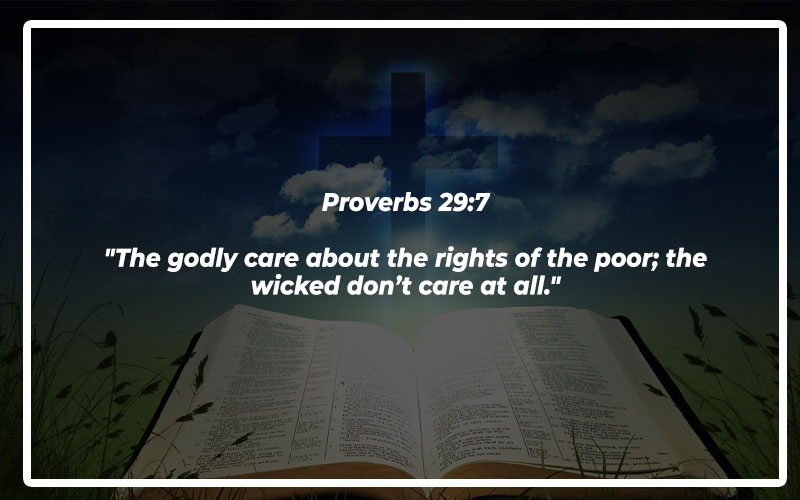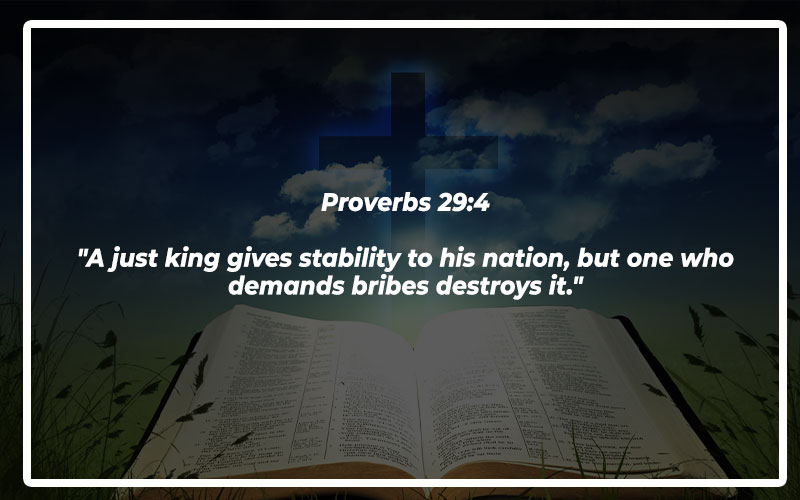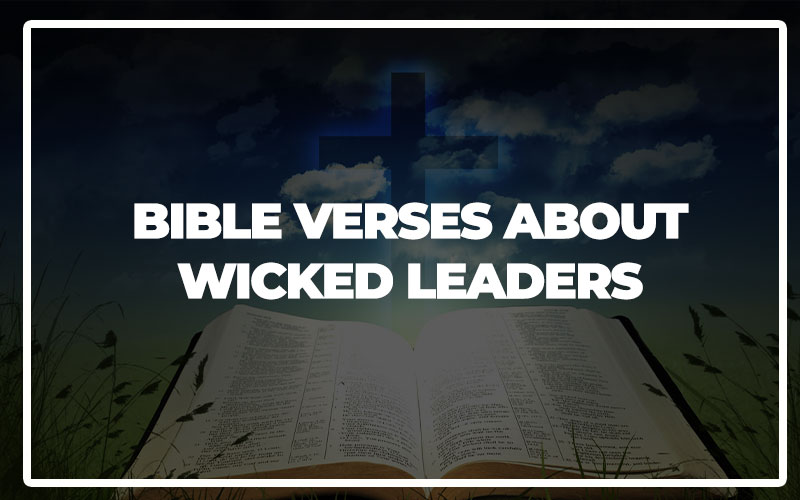Throughout the Bible, wicked leaders are often seen as individuals who misuse their power, leading people astray from God’s commands and justice. These verses serve as a warning against unrighteous rulers and provide insight into God’s stance on corrupt leadership. As believers, it is vital to recognize the impact of ungodly leadership and align ourselves with God’s will.
Also Read: Bible Verses About Wicked Government
Leaders Who Oppress the Poor
God detests leaders who exploit their authority to harm the vulnerable. The Bible consistently shows that leaders are to uphold justice and care for the poor, the widow, and the orphan. Wicked leaders, however, use their power to oppress and enrich themselves at the expense of the needy.
Proverbs 29:7
“The godly care about the rights of the poor; the wicked don’t care at all.”

This verse draws a sharp contrast between righteous and wicked leaders. While the godly are concerned with justice and fairness for the poor, wicked leaders are indifferent, lacking empathy and responsibility toward the underprivileged. It’s a call to uphold justice and to care for those in need, reflecting God’s heart for the oppressed.
Isaiah 10:1-2
“What sorrow awaits the unjust judges and those who issue unfair laws. They deprive the poor of justice and deny the rights of the needy among my people.”
Here, God’s anger is directed at those who create laws that harm the poor. Leaders who are corrupt and pass unjust decrees face God’s judgment. This verse warns that abusing power to oppress the poor is not only immoral but will also lead to divine retribution.
Psalm 72:4
“Help him to defend the poor, to rescue the children of the needy, and to crush their oppressors.”
This Psalm, a prayer for righteous leadership, highlights the responsibility of leaders to protect and serve the poor. Wicked leaders who instead oppress will face judgment. It shows God’s expectation for leaders to defend the vulnerable and act with righteousness.
Ezekiel 22:29
“Even common people oppress the poor, rob the needy, and deprive foreigners of justice.”
This verse emphasizes societal corruption, where even the leaders are guilty of oppressing the poor. It reflects a breakdown of justice and mercy in leadership. God’s heart for justice is clear: leadership that denies fairness to the weak brings His judgment.
Proverbs 28:15
“A wicked ruler is as dangerous to the poor as a roaring lion or an attacking bear.”
This powerful imagery describes how harmful and destructive a wicked leader can be to the poor. Like a wild animal attacking its prey, wicked rulers seek to devour and oppress, caring only for their gain. It underscores the danger of unjust leadership and its devastating impact on society’s most vulnerable.
Corrupt Leaders and Their Fate
The Bible speaks clearly about the eventual fate of corrupt leaders. Their arrogance, greed, and dishonesty lead them to destruction. God does not overlook wickedness, and the Bible assures us that corrupt rulers will be held accountable for their actions.
Psalm 94:20-21
“Can unjust leaders claim that God is on their side—leaders whose decrees permit injustice? They gang up against the righteous and condemn the innocent to death.”
This verse questions the audacity of wicked leaders who act as if God supports their unjust rule. God sees their corruption and does not stand with leaders who promote injustice. Their condemnation of the innocent will not go unpunished.
Micah 3:11-12
“You rulers make decisions based on bribes; you priests teach God’s laws only for a price; you prophets won’t prophesy unless you are paid. Yet all of you claim to depend on the Lord.”
Micah condemns leaders who pervert justice for personal gain while pretending to rely on God. Such hypocrisy is detestable to God. These leaders deceive the people but cannot deceive God, who will bring judgment on them for their corruption.
Jeremiah 22:17
“But you! You have eyes only for greed and dishonesty! You murder the innocent, oppress the poor, and reign ruthlessly.”
Jeremiah rebukes leaders whose hearts are set on greed and oppression. These leaders fail to rule with compassion or justice, instead using their power to serve their selfish interests. God sees their wickedness and holds them accountable for their actions.
Isaiah 1:23
“Your leaders are rebels, the companions of thieves. All of them love bribes and demand payoffs, but they refuse to defend the cause of orphans or fight for the rights of widows.”
Isaiah’s words are a rebuke of corrupt leadership. Wicked rulers ally with criminals and accept bribes, neglecting their duty to protect the most vulnerable in society. This verse highlights God’s anger toward leaders who pervert justice and fail to care for the needy.
Proverbs 16:12
“A king detests wrongdoing, for his rule is built on justice.”
Righteous leadership, built on justice, is opposed to all forms of wickedness. A just ruler cannot tolerate corruption because it undermines the very foundation of godly leadership. This proverb underscores that justice is central to leadership in line with God’s will, and wicked leaders cannot maintain power forever.
Warning Against Abusing Authority
Abusing power for personal gain is a common trait of wicked leaders. The Bible warns against this behavior, showing that leaders who misuse their authority not only harm others but also bring judgment upon themselves.
Matthew 23:4
“They crush people with unbearable religious demands and never lift a finger to ease the burden.”
Jesus condemns the religious leaders of His day for their hypocrisy and oppression. They burden the people with heavy regulations but offer no help or compassion. This passage serves as a reminder that leaders should serve with humility and care for those under their authority, not use their power to exploit or oppress.
Ezekiel 34:4
“You have not taken care of the weak. You have not tended the sick or bound up the injured. You have not gone looking for those who have wandered away and are lost.”
God condemns the shepherds of Israel for neglecting their duty to care for the people. Wicked leaders focus on their gain rather than tending to the needs of the weak and vulnerable. True leadership, in contrast, should reflect God’s heart by caring for the lost, the sick, and the weak.
Proverbs 28:16
“A ruler with no understanding will oppress his people, but one who hates corruption will have a long life.”
This verse contrasts the outcomes of just and unjust leadership. A ruler who lacks wisdom and understanding will oppress the people, leading to ruin. In contrast, a leader who rejects corruption and seeks justice will experience longevity in leadership and blessing from God.
Jeremiah 22:13
“And the Lord says, ‘What sorrow awaits Jehoiakim, who builds his palace with forced labor. He builds injustice into its walls, for he makes his neighbors work for nothing, he does not pay them for their labor.’”
Jeremiah speaks against Jehoiakim’s oppressive rule, where he exploits workers for his benefit. Leaders who abuse their power by exploiting others bring sorrow upon themselves. This verse highlights God’s disdain for injustice, especially when leaders force others into unfair labor.
1 Peter 5:3
“Don’t lord it over the people assigned to your care, but lead them by your own good example.”
The apostle Peter encourages leaders to serve with humility and lead by example, not to abuse their power. True leadership is marked by service and integrity. Wicked leaders, however, dominate and oppress those under their authority, which is contrary to God’s desire for leadership that reflects His love and justice.
Also Read: Bible Verses About the Wicked Being Punished
God’s Judgment on Wicked Leaders
God’s justice ensures that wicked leaders will not escape His judgment. Though they may seem powerful and untouchable in this life, their wickedness does not go unnoticed by God, and they will face divine retribution.
Isaiah 3:14-15
“The Lord comes forward to pronounce judgment on the elders and rulers of his people. ‘You have ruined Israel, my vineyard. Your houses are filled with things stolen from the poor.’”
God holds the leaders of Israel accountable for their actions. They have exploited and stolen from the poor, and now God’s judgment is upon them. This verse reassures us that wicked leaders cannot hide from God’s justice, and their evil deeds will be judged.
Psalm 110:5-6
“The Lord stands at your right hand to protect you. He will strike down many kings when his anger erupts.”
This Psalm speaks of God’s power and the certainty of His judgment against wicked rulers. No king or leader is beyond God’s reach. When His anger is kindled against injustice and wickedness, He strikes down corrupt rulers, reinforcing His sovereignty over all nations.
Jeremiah 23:1
“‘What sorrow awaits the leaders of my people—the shepherds who destroy and scatter the sheep of my pasture!’ says the Lord.”
God laments over the corrupt leaders who have scattered His people through their wickedness. Instead of nurturing and guiding, they have caused harm and division. Their actions grieve God’s heart, and He promises that sorrow awaits such leaders who fail in their duties.
Ezekiel 34:10
“This is what the Sovereign Lord says: I now consider these shepherds my enemies, and I will hold them responsible for what has happened to my flock.”
God declares that He will personally hold wicked leaders accountable for their actions. By failing to care for the people, they have made themselves enemies of God. This verse emphasizes that leadership is a sacred responsibility, and those who misuse it will face God’s judgment.
Psalm 37:17
“For the strength of the wicked will be shattered, but the Lord takes care of the godly.”
This verse offers hope by declaring that the power of wicked leaders is temporary. Though they may seem strong and invincible, their strength will ultimately be shattered by God’s justice. In contrast, God cares for the righteous and ensures their protection, offering a reminder that wickedness will not prevail forever.
The Folly of Trusting Wicked Leaders
Trusting in wicked leaders leads to destruction. The Bible warns us not to place our confidence in corrupt rulers who lead through deceit, lies, and oppression. Instead, we are to trust in God alone, who is just and righteous in all His ways.
Psalm 118:9
“It is better to take refuge in the Lord than to trust in princes.”
This verse teaches that it is foolish to place ultimate trust in human leaders, especially those who are wicked. Only God is a reliable refuge. While leaders may fail, God is steadfast and righteous, offering security that no earthly ruler can provide.
Jeremiah 17:5
“This is what the Lord says: ‘Cursed are those who put their trust in mere humans, who rely on human strength and turn their hearts away from the Lord.’”
Jeremiah’s prophecy warns against placing trust in human strength, particularly in corrupt leaders. Those who rely on wicked rulers instead of God bring a curse upon themselves. True security is found in trusting the Lord, not in the frailty of human authority.
Proverbs 29:12
“If a ruler pays attention to liars, all his advisers will be wicked.”
This proverb highlights the danger of a leader who surrounds themselves with corrupt and deceitful advisors. A wicked leader listens to lies and falsehoods, leading to a government filled with corruption. Trust in such leaders is misplaced, as they foster an environment of dishonesty and unrighteousness.
Isaiah 30:1
“What sorrow awaits my rebellious children, says the Lord. You make plans that are contrary to mine. You make alliances not directed by my Spirit, thus piling up your sins.”
Isaiah rebukes the people for trusting in political alliances with corrupt nations instead of seeking God’s guidance. Wicked leaders often lead people into dangerous alliances and decisions that go against God’s will. Trusting in such leadership brings sorrow and sin, emphasizing the need to follow God’s direction.
Psalm 146:3
“Don’t put your confidence in powerful people; there is no help for you there.”
The Psalmist reminds us that putting confidence in powerful, yet wicked, leaders is futile. Human rulers, especially those who act unjustly, are incapable of providing lasting help. True hope and salvation come from God alone, not from earthly leaders who ultimately fail to deliver justice and righteousness.
The Role of Godly Leaders
In contrast to wicked leaders, godly leaders strive to serve the people and uphold justice. The Bible offers numerous examples of what righteous leadership looks like, calling leaders to be humble, just, and compassionate, reflecting the character of God in their authority.
Proverbs 29:4
“A just king gives stability to his nation, but one who demands bribes destroys it.”

Righteous leadership is marked by justice, which brings stability and peace to a nation. In contrast, a wicked leader who demands bribes and acts corruptly destroys the very foundation of society. This verse highlights the importance of godly leadership in maintaining justice and ensuring the well-being of a nation.
1 Timothy 3:2-3
“So a church leader must be a man whose life is above reproach. He must be faithful to his wife. He must exercise self-control, live wisely, and have a good reputation. He must enjoy having guests in his home, and he must be able to teach.”
Godly leaders, especially in the church, are called to live lives of integrity. Their character and conduct should reflect Christ’s values, setting an example for others to follow. This verse emphasizes that leadership is not about power, but about living a life that honors God and cares for others.
Psalm 78:72
“He cared for them with a true heart and led them with skillful hands.”
This verse describes King David’s leadership, highlighting the qualities of a godly leader. He ruled with integrity and skill, showing that effective leadership combines righteousness and wisdom. Wicked leaders, in contrast, lack these qualities, leading to disorder and injustice.
Titus 1:7-8
“For an elder must live a blameless life. He must not be arrogant or quick-tempered. He must not be a heavy drinker, violent, or dishonest with money. Rather, he must enjoy having guests in his home, and he must love what is good.”
Paul outlines the qualities expected of godly leaders, focusing on humility, patience, and integrity. These traits are in stark contrast to the behavior of wicked leaders who act with arrogance, violence, and dishonesty. Godly leadership reflects Christ’s character, and leaders are called to live in a way that honors God and serves others.
Proverbs 16:10
“The king speaks with divine wisdom; he must never judge unfairly.”
This verse emphasizes the responsibility of leaders to judge with wisdom and fairness. A godly leader seeks divine guidance and acts justly, ensuring that their decisions reflect God’s truth. Wicked leaders, however, judge unfairly, leading to corruption and injustice. Righteous judgment is central to godly leadership and maintaining a just society.
The Call to Pray for Leaders
The Bible calls believers to pray for their leaders, even those who may be wicked. Prayer has the power to bring about change and to align leaders’ hearts with God’s will. Through prayer, we can seek God’s intervention and guidance for those in authority.
1 Timothy 2:1-2
“I urge you, first of all, to pray for all people. Ask God to help them; intercede on their behalf, and give thanks for them. Pray this way for kings and all who are in authority.”
Paul encourages believers to pray for all leaders, regardless of their character. Through prayer, we can ask God to guide them in righteousness and to change their hearts. Even in the face of wicked leadership, prayer remains a powerful tool to seek God’s intervention.
Proverbs 21:1
“The king’s heart is like a stream of water directed by the Lord; he guides it wherever he pleases.”
This verse reminds us that ultimately, God is in control of even the most powerful leaders. While wicked leaders may seem beyond reach, God has the power to direct their hearts and decisions. Through prayer, we can trust that God is sovereign over all authority.
Romans 13:1
“Everyone must submit to governing authorities. For all authority comes from God, and those in positions of authority have been placed there by God.”
Paul reminds believers that even flawed leaders are under God’s sovereign control. While we may not always agree with or trust our leaders, we are called to respect their authority and trust that God is ultimately in control. Praying for leaders is an important way to align our hearts with God’s will.
1 Peter 2:17
“Respect everyone, and love the family of believers. Fear God, and respect the king.”
Peter calls for respect toward all leaders, even those who are unjust. This command doesn’t mean blind obedience, but rather a heart posture of respect and trust in God’s authority. By praying for leaders and trusting God, believers can influence change and uphold godly values in their societies.
Jeremiah 29:7
“And work for the peace and prosperity of the city where I sent you into exile. Pray to the Lord for it, for its welfare will determine your welfare.”
Even in difficult circumstances, believers are called to pray for the well-being of their leaders and their communities. By seeking God’s peace and prosperity for the places where we live, we contribute to a better society. Prayer is a powerful way to bring God’s justice and mercy into the world, even under wicked leadership.
Also Read: Bible Verses About Wickedness

